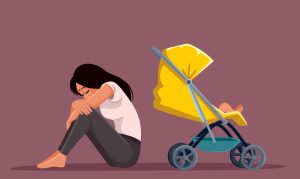While having a child is supposed to be the most exciting and wonderful thing in life, sometimes after the birth of a child, the mother, or even the father, can experience sadness and even depression. This is not due to actual loss but a chemical imbalance within the neurotransmitters that is offset. In mothers, it can be due to a variety of hormonal issues, while in fathers, it can be due to past depression history. “Baby Blues”, when it does occurs, lasts anywhere from a few days to a two weeks, but if it persists into depression, it is important to seek help from one’s doctor to help properly balance oneself. This is why it is so important for spouses, family and friends to observe each other during the first few weeks after child birth. Usually the emphasis is on the infant only but changes in mood for parents are also important things to watch and monitor. This type of situation is not anything to be ashamed of or a dismissal of the joyous occasion, but merely is mental health and properly taking care of it.

Many of the symptoms associated with Post Partum Depression mirror any other type of depression but the biggest issue is it prevents proper bonding with one’s child and can make it harder to meet the needs of the new infant. This happy moment should be an experience of joy, but when depression sinks in, it can be difficult to enjoy these memorial moments or even worst, cause risk to self or the child. This is why it is so critical to seek help.
The article, “Post Partum Depression” from the Mayo Clinic takes a closer look at issues surrounding sadness, depression or even psychosis after child birth. The article states,
“The birth of a baby can start a variety of powerful emotions, from excitement and joy to fear and anxiety. But it can also result in something you might not expect — depression. Most new moms experience postpartum “baby blues” after childbirth, which commonly include mood swings, crying spells, anxiety and difficulty sleeping. Baby blues usually begin within the first 2 to 3 days after delivery and may last for up to two weeks. But some new moms experience a more severe, long-lasting form of depression known as postpartum depression”.
“Post Partem Depression”. Mayo Clinic. (2022). Mayo Clinic
To read the entire article, please click here
Commentary
Becoming a mother is a life-changing experience, but it can also bring about unexpected challenges. One such challenge is postpartum depression, a condition that affects many women after giving birth. Understanding postpartum depression is the first step towards finding effective strategies to deal with it. Postpartum depression is not simply a case of “baby blues” or feeling a bit down; it is a serious mental health condition that requires attention and support.
Postpartum depression can manifest in different ways, but some common signs and symptoms include persistent feelings of sadness, anxiety, and irritability. Women experiencing postpartum depression may also struggle with sleep disturbances, changes in appetite, and a lack of interest in activities they once enjoyed. It’s important to recognize these symptoms and seek help if they persist for more than a couple of weeks. Postpartum depression can have a profound impact on a mother’s overall well-being, as well as on her relationships and family dynamics.
The impact of postpartum depression on mothers and families
Postpartum depression not only affects the mother, but it can also have a significant impact on her relationships and family. The emotional and physical toll of postpartum depression can strain the bond between the mother and her partner, leading to feelings of isolation and resentment. In some cases, postpartum depression can even affect the mother’s ability to bond with her newborn baby, potentially impacting the child’s development.

Furthermore, postpartum depression can disrupt the entire household dynamic. Partners may need to take on additional responsibilities, and other family members may need to step in to provide support. This can create stress and tension within the family, further exacerbating the challenges faced by the mother. Recognizing the impact of postpartum depression on mothers and families is crucial in order to provide the necessary support and understanding during this difficult time.
Effective strategies for dealing with postpartum depression
Dealing with postpartum depression requires a multi-faceted approach that addresses both the physical and emotional aspects of the condition. While it is important to seek professional help, there are also effective strategies that can be implemented on a daily basis to manage symptoms and promote recovery.
One such strategy is self-care. Taking care of oneself is often overlooked when dealing with postpartum depression, but it is essential for the mother’s well-being. This can include engaging in activities that bring joy and relaxation, prioritizing sleep and nutrition, and finding ways to manage stress. Self-care is not selfish; it is a necessary step towards healing and recovery.
Building a support system is another crucial aspect of dealing with postpartum depression. Surrounding oneself with understanding and supportive individuals can make a world of difference. This can include reaching out to family and friends, joining support groups specifically for postpartum depression, or connecting with other mothers who have gone through similar experiences. Having a support system in place provides a sense of validation and helps combat feelings of isolation.
Seeking professional help for postpartum depression
While self-care and support systems are important, it is essential to seek professional help when dealing with postpartum depression. Mental health professionals, such as therapists or counselors specializing in postpartum depression, can provide the necessary guidance and support. They can help identify underlying causes, develop coping mechanisms, and provide effective treatment options.
Antidepressant medication may also be prescribed in some cases, especially if the symptoms of postpartum depression are severe. It is important to consult with a healthcare provider to determine the best course of action. Seeking professional help is not a sign of weakness; it is a proactive step towards recovery and empowerment.
Support groups and resources for postpartum depression
Support groups can be a valuable resource for women dealing with postpartum depression. These groups provide a safe and understanding space where mothers can share their experiences, receive support, and learn from others who have faced similar challenges. Support groups can be found both online and in-person, offering flexibility and accessibility.
There are also numerous resources available for women experiencing postpartum depression. Websites, books, and podcasts dedicated to postpartum depression provide valuable information and strategies for coping. Additionally, many organizations offer helplines and online chat services where women can seek guidance and support in real-time. Utilizing these resources can help women feel empowered and less alone in their journey towards recovery.
Self-care tips for managing postpartum depression
Self-care is an essential component of managing postpartum depression. Here are some practical self-care tips that can be incorporated into daily routines:
- Prioritize sleep: Aim for quality sleep by establishing a regular sleep schedule and creating a relaxing bedtime routine.
- Nourish your body: Focus on eating a balanced diet that includes nutrient-rich foods to support overall well-being.
- Engage in gentle exercise: Physical activity, such as yoga or walking, can help boost mood and reduce stress.
- Practice mindfulness: Incorporate mindfulness techniques, such as deep breathing or meditation, to promote relaxation and reduce anxiety.
- Delegate and ask for help: Don’t be afraid to ask for assistance from loved ones or hire help with household tasks to alleviate some of the pressure.
- Engage in activities you enjoy: Make time for hobbies or activities that bring you joy, whether it’s reading, painting, or listening to music.
Remember, self-care is not a luxury but a necessity for your well-being. By prioritizing self-care, you are better equipped to navigate the challenges of postpartum depression.
Building a support system for postpartum depression
Building a support system is crucial for women dealing with postpartum depression. Here are some strategies for creating a strong support network:
- Communicate with your partner: Openly discuss your feelings with your partner and seek their understanding and support.
- Reach out to family and friends: Share your experiences with trusted loved ones who can provide emotional support and practical assistance.
- Join support groups: Connect with other women experiencing postpartum depression through local support groups or online communities.
- Seek professional help: Consult with mental health professionals who specialize in postpartum depression for guidance and support.
- Consider therapy for couples: Couples therapy can help improve communication and strengthen the relationship during this challenging time.
Remember, you don’t have to face postpartum depression alone. Building a support system can provide the encouragement and understanding you need to navigate this difficult period.
Creating a postpartum depression action plan
Creating an action plan can help you navigate the challenges of postpartum depression proactively. Here are some steps to consider when developing your plan:
- Educate yourself: Learn about postpartum depression, its symptoms, and available resources.
- Set realistic goals: Break down your recovery journey into manageable steps to avoid feeling overwhelmed.
- Identify triggers: Recognize the situations or circumstances that worsen your symptoms, and develop strategies to manage them.
- Establish a routine: Creating a daily routine can provide structure and stability during this unpredictable time.
- Practice self-care: Incorporate self-care activities into your daily routine to prioritize your well-being.
- Seek professional help: Consult with mental health professionals to develop a personalized treatment plan.
By creating an action plan, you are taking an active role in managing your postpartum depression and empowering yourself towards recovery.
Conclusion

Dealing with postpartum depression can be challenging, but it is important to remember that you are not alone. By understanding postpartum depression, recognizing its impact, and implementing effective strategies, you can navigate this difficult period and empower yourself towards recovery. Whether it’s through self-care, seeking professional help, or building a support system, each step you take brings you closer to healing and embracing the joys of motherhood. Remember to be kind to yourself and reach out for the support you deserve.
Please also review AIHCP’s Grief Counseling Certification and see if it meets your academic and professional goals. The program is online and independent study and open to qualified professionals seeking a four year certification. Licensed professionals in counseling are excellent candidates to earn a Grief Counseling Certification.
Additional Resources
“Postpartum Depression”. HealthEssentials. (2022). Cleveland Clinic. Access here
“Everything You Need to Know About Postpartum Depression: Symptoms, Treatments, and finding help”. Pietrangelo, A. (2022). Healthline. Access here
“Postpartum Depression”. OASH. (2023). Office on Women’s Health. Access here
“Postpartum Depression”. Bruce, D. (2022). WebMD. Access here
